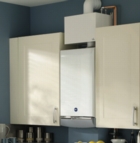BDR Thermea adds to Multifit range of solutions

Two products from BDR Thermea, formerly Baxi Group, can considerably increase the efficiency of combi boilers by recovering energy from flue gases. These products are listed under SAP Appendix Q and can make a significant contribution for specifiers seeking to achieve the energy-saving targets required to meet levels 3 and 4 of the Code for Sustainable Homes.
The MultiFit GasSaver (pictured) is a passive flue-gas recovery system that can reduce boiler energy consumption by up to 37% by preheating cold mains water. It can also reduce water consumption by up to 7%. It is designed for use with Baxi and Potterton SEDBUK (200%) Band A combi boilers and is suitable for new and retrofit projects.
The Multifit HeatSaver package further reduces gas consumption by adding a 50 litre temporal store to the GasSaver system. Heat Save can achieve up to a 7.5% carbon reduction in SAP levels. Preheated water from the flue-gas recovery system passes through the temporal store, where its temperature is raised to 60°C by passing through a heat exchanger heated by the central-heating system. A blending valve between the temporal store and the boiler maintains a flow temperature of 30° to maximise the heat gained and reduce gas consumption for producing hot water.







